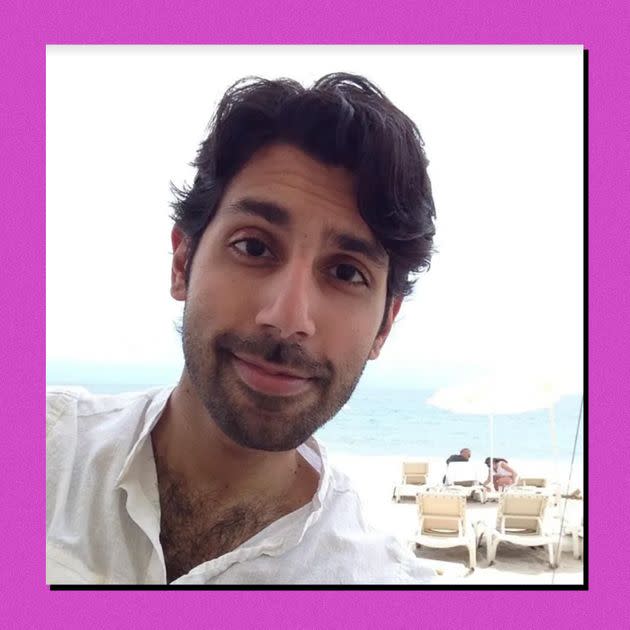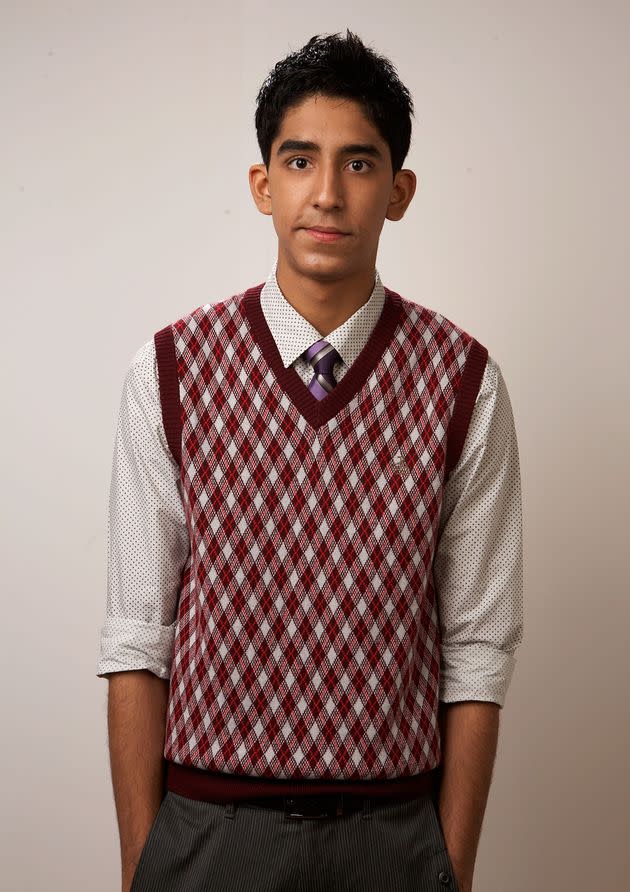Guys Often Compare Me To A Famous Actor. They Think It's A Compliment — Here's Why It's Not.
- Oops!Something went wrong.Please try again later.
- Oops!Something went wrong.Please try again later.

The author in 2010. (Photo: COURTESY RENEYSH VITTAL)
No one tells you about stretching before straddling.
It always looks so sexy in movies and porn when someone climbs on top of another person. They slither up on someone else’s lap, spread their legs and writhe on their crotch. It’s a tease of what’s to come when the clothes are finally ripped off and flung into the corner.
There I was on the a lap of a pretty hipster, our jeans rubbing away what little blue they had, and I was in pain!
But I grinned and bore it, making my grunts of discomfort sound like enthusiasm for our intended purpose.
Long story short: Grindr, L train, his couch ― all in less than half an hour. Magic!
He was classic Williamsburg fare. White, bearded, man-bunned, pierced, tattooed, and looking up at me with a big smile. We continued to make out and the pain subsided (as long as I didn’t move my leg anymore). Then his hands were under my shirt and mine were working on his belt buckle.
“You’re beautiful” I told him. And he was, so it felt right to say.
“So are you!” he responded. His enthusiasm was amusing. “You actually look like your profile!”
“You do too,” I laughed between kisses. It was verbal foreplay for the digital age. I wanted to hustle things along to the bed (or at least horizontally), so there was no chance of me straining my leg again.
He stopped kissing me and ran his bejeweled fingers through my hair and then clasped them around the back of my neck. He looked at me admiringly. If you could see past my natural tan, I was blushing.
“You know... you look...” he began. I winced and prepared myself for the inevitable line that he and many other white boys feel the need to deliver to me. Please don’t say it, I thought.
“You look like... that guy from that ‘Slumdog’ movie... Dave something?”
He pulled me closer, forcing my legs to spread on his lap.
I planted my lips on him and let out a low growl. Maybe it was from my still-throbbing leg. Maybe from my frustration. Maybe from my resignation.
It definitely wasn’t from arousal.
***
In 2008 we witnessed the spectacle of the Beijing Olympics, the debacle of the financial recession, and the nail-biting drama of the presidential election.
It was also the year a little movie called “Slumdog Millionaire,” directed by Danny Boyle, premiered and quickly became its own real-life version of the rags-to-riches plot that played out on screen when it went from sleeper hit to Best Picture Oscar winner.
It also introduced the world to a young, charming, somewhat goofy-looking (at least in my opinion) South Asian actor from the U.K. named Dev Patel.
After “Slumdog,” his star continued to rise and was bolstered by roles in the comic ”Best Exotic Marigold Hotel” series, the dramatic tear-jerker “Lion,” for which he was nominated for an Oscar, and the thriller “Hotel Mumbai,” based on the 2008 terrorist attacks on the Taj Mahal Palace Hotel.
That hotel is located a few streets from where I grew up in what was once called Bombay. If I still lived there, I would have been able to see the smoke and ash from the smoldering building from our family’s apartment.
This is all to say that in the years that followed his splashy debut, more and more people became aware of his existence, a fact that I have struggled with personally.
At first, I was thrilled. Finally, an actor of Indian descent being talked about in the same breath as Brad Pitt, Matt Damon and Denzel Washington. I was proud of Patel and his accomplishments and hoped this would be a turning point in the U.S. media landscape for Indian representation. India was suddenly deemed a “hot” topic.
Then the comparisons began. So did the resentment.
I moved to New York after college exactly one year before “Slumdog Millionaire” came out. At that time, dating, for me, was difficult.
The bar scene made me anxious, the hookup apps were still in their infancy, and I’d already been on a couple of failed blind dates with the few gay co-workers with whom my straight friends had set me up.
I met my first serious boyfriend on Craigslist, of all places. He was sweet and funny and loved film. He was also white, and I was the first Indian man he ever dated.
Movies were our thing. We went to see “Slumdog Millionaire” together at the now-defunct Sunshine Cinema on Houston Street.
Moments after leaving the theater, he joked, “Well, looks like you may have some competition.”
I laughed, then still completely unaware being compared to Patel would be a recurring theme in my dating life.

Dev Patel poses for a portrait during the 2008 Toronto International Film Festival. (Photo: Matt Carr via Getty Images)
In the years following that relationship, whether with new partners or one-night stands or just being flirted with by guys on the apps, Patel’s name came up often.
I hated it. I also begrudgingly accepted it. It got me laid.
This was not just white men. People of different backgrounds and genders, whether in bed or at a party, made this reference. Each time it was presented as a compliment, as if to say, “Hey! You look like a movie star!”
The first Indian guy I went out with and other subsequent queer Desi friends and dates have all commiserated with me.
“It’s like he’s the only Indian guy they can think of!” he told me, having received the comment himself. “I mean ― we don’t even look like him!”
Take a look at the photo at the top of this essay and I think you’ll agree. I would not be stopped in the street because I was mistaken for Patel (especially now that he’s grown out his hair and beard).
As I browse old Facebook photos from around the time the comparisons started, I see a few touch points in common: thick eyebrows, ears that stick out a bit, a pronounced nose. We’re the same height (6’2”) and slender (me less so these days. Thanks, lockdown!).
But there’s not much else. I have more hair on my chest than he on his entire body. In interviews he’s usually calm and humble, and I’m a bit more frantic and expressive. We also have completely different backgrounds. I was born in India and immigrated with my family to California in 2000. He’s six years younger and from London.
He’s also straight, and that brings its own problems (that old prevalent fantasy of gay men lusting after unattainable straight men).
But let’s get down to brass ― or, rather, brown ― tacks. We are both light-skinned Indian men. And that seems to be enough for most people to tether us together.
In the 14 years since the premiere of “Slumdog Millionaire,” we have been blessed with a slew of desi actors. I hope Himesh Patel, Manish Dayal, and Viveik Kalra (to name a few) will become household names alongside Riz Ahmed, Aziz Ansari, Kumail Nanjiani and Kunal Nayyar.
Asian representation in Western media has come a long way in the last 20 years, so one would think that the microaggressions of being compared to a random celebrity should be on the decline. The same goes for being reduced to one’s cuisine or stereotyped accent.
But we still have a long way to go.
I know these comments have never been meant maliciously, but still, they’re problematic. For every fetishizing creep, there are people who seem to use the comparison as a clunky but well-meaning bridge to learn more about me and my culture. Something that perhaps they don’t find in their friend or family circles.
So, I help them along when I can and I use Patel to do it.
“Have you seen his movies?” I’ll ask. “What’s your favorite? Any other Indian cinema or media you’ve experienced? Did you know I was born and raised there until I was 16? Ever been? If you went, what would you like to see and do?”
Sometimes these questions can cause the other person to get flustered but generally it’s a nice moment of reckoning. Many of these conversations turn out to be surprisingly insightful. The initial microaggressions are understood by the person who made them and we’re able to push past them.
I’ve found that most of the time people want to learn and engage. And they often know more than they let on. It ends up being a very cool moment of cultural exchange.
And I hope the dialogue continues, because it’s during these discussions that they see me for me: a man with my own identity and experiences. Proud of my heritage and individual journey. Desirable and strong in my own way.
The star of my own movie.
Reneysh Vittal is a writer living in New York City. His work has appeared in Vice, Conde Nast Traveler, NPR and Oxford University Press. You can read more from him at www.RVITTAL.com and contact him on Twitter at @ReneyshV.
Do you have a compelling personal story you’d like to see published on HuffPost? Find out what we’re looking for here and send us a pitch.
This article originally appeared on HuffPost and has been updated.

